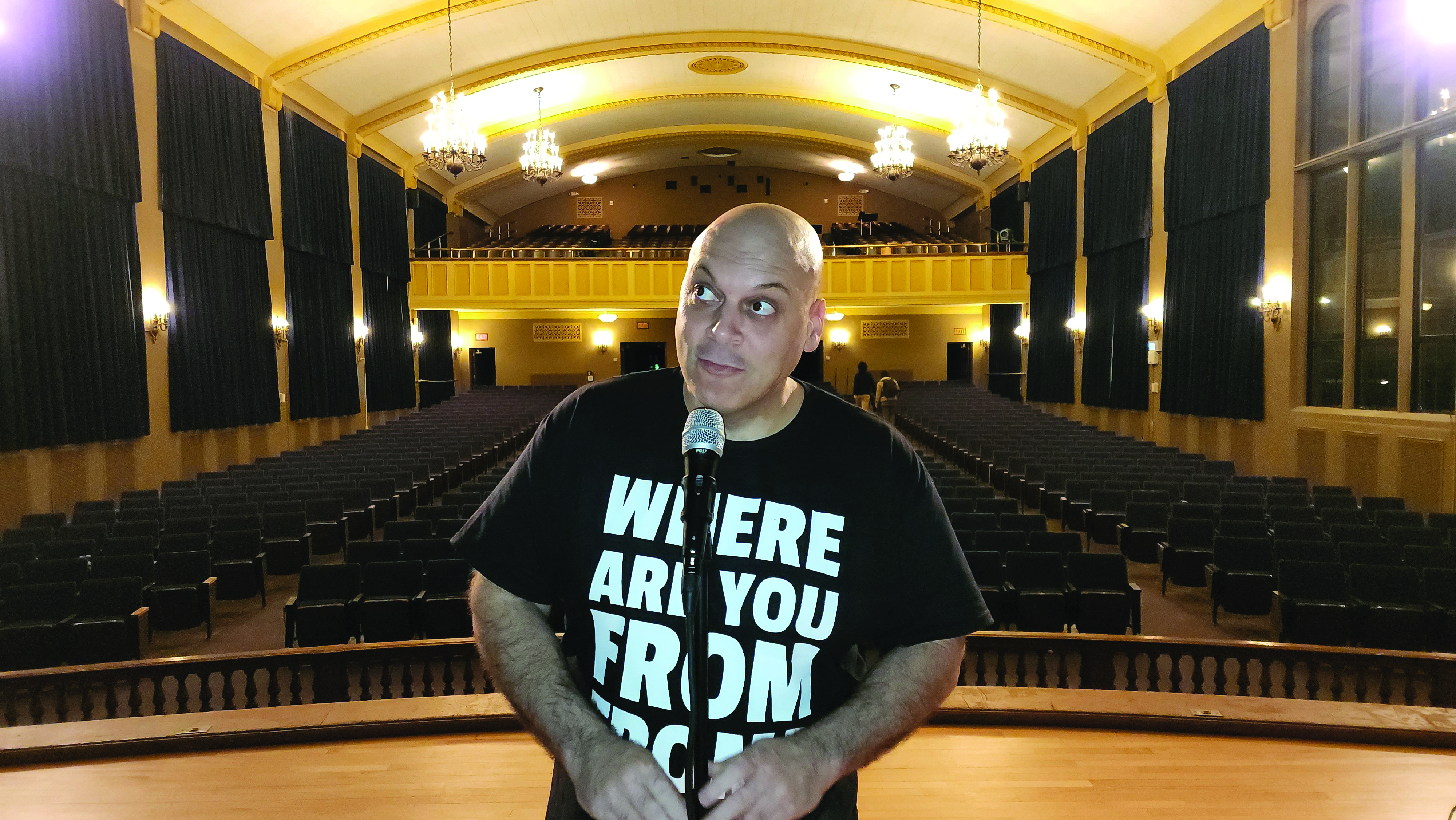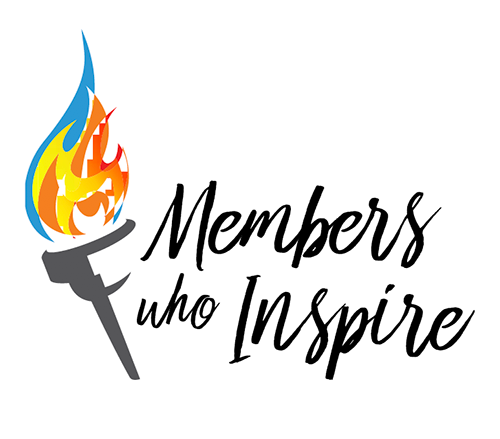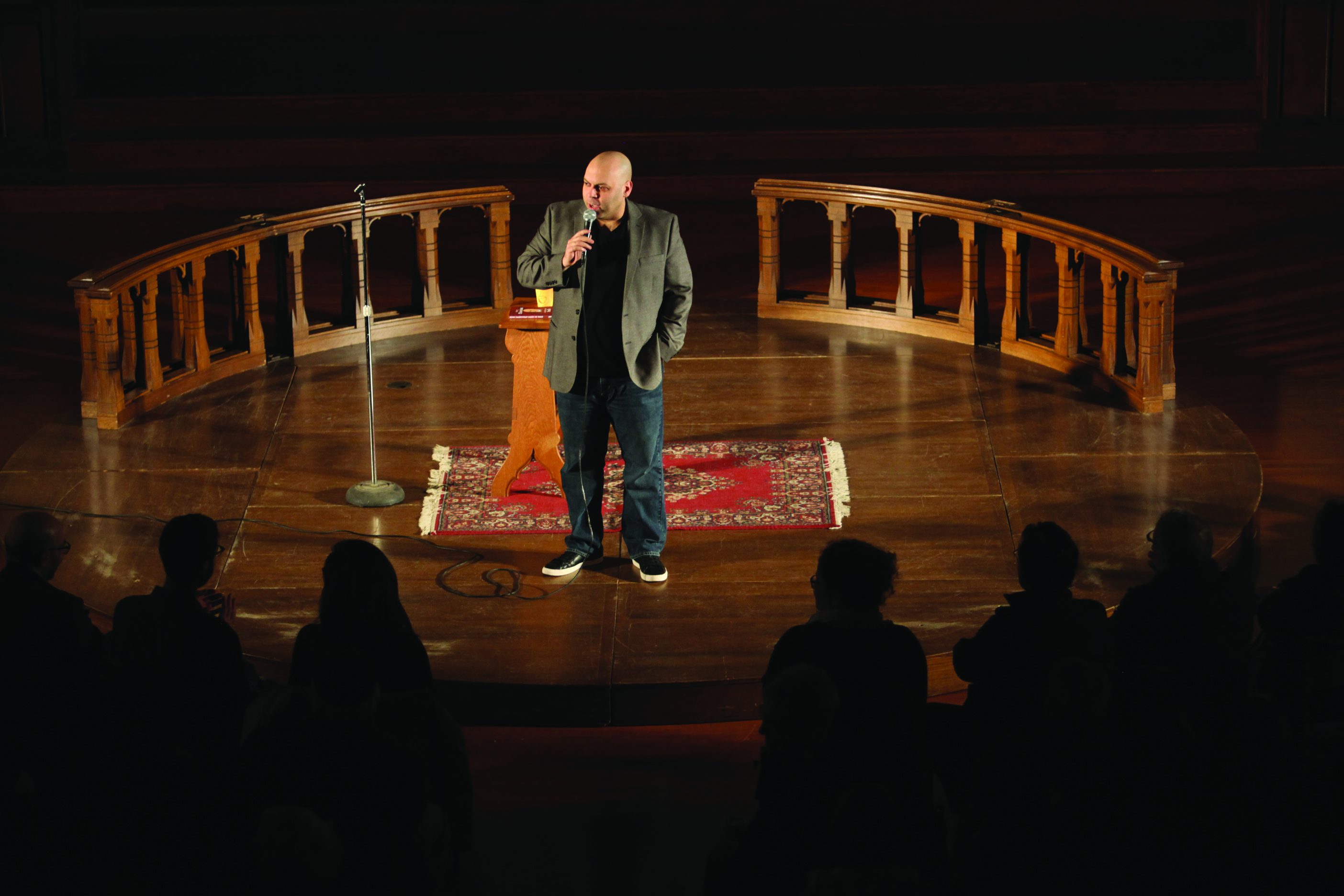Amer Zahr uses passions for law and comedy to promote Arab rights

Amer Zahr is shown on the auditorium stage at Fodson High School in Dearborn, Michigan, before the taping of his 2022 comedy special, "We're Still Not White." Photo by Houssam Mchaimech.
To Amer Zahr, the worlds of law and comedy aren’t that different.
“Law school teaches you to think in a way and advocate in a way where you are brief and to the point,” Zahr says. “Comedy is the same thing. Comedy is about boiling down society or an issue, communicating it quickly and including laughter in some way. It doesn’t mean all lawyers would be good comedians—they’re definitely not,” he adds. “But the skill sets overlap.”
Zahr, a Palestinian American comedian and adjunct professor at the University of Detroit Mercy School of Law, speaks from experience. For nearly 20 years, he has performed, lectured and written on law, politics, society and culture. He has drawn much of his perspective from his heritage and upbringing, tracing the roots of his interest in law and comedy back to an earlier passion for community activism.
“It’s important for me to connect with my ancestral homeland as much as I can and to show that Palestinians are a people who are under occupation and fighting for their rights—but they are still trying to live like everyone else in the world, to laugh and love like everyone else in the world,” Zahr said during an interview conducted weeks before the current conflict in Gaza started in October.

Khaled Beydoun, an associate professor at the Sandra Day O’Connor College of Law at Arizona State University, met Zahr when they were students at the University of Michigan in Ann Arbor. He describes Zahr as charismatic and relatable, and he isn’t surprised he has emerged as one of the leading advocates for Palestinian human rights.
“He’s somebody who is able to excel in a range of different spheres—as a lawyer and law professor, as an activist, as a comedian,” Beydoun says. “Doing all those things allows him to reach and resonate with different audiences.”
Twist of fate
Zahr, who was born in Jordan, is the eldest son of Palestinian refugees. He was 3 when his family settled in the suburbs of Philadelphia, and he assimilated quickly as a child.
He played baseball and remembers fitting in with American—and mostly white—kids. But everything changed in middle school, when he ran for class president around the same time the United States bombed Iraq during the Gulf War. “My dad made photocopies of my face and put them everywhere around the school, and when I came in the next day, somebody had written on one of my faces, ‘Go home, terrorist,’” Zahr says. “I knew we were different. We ate different food. My parents had accents. But I never knew how different I was until that happened.”
As he grew older, Zahr connected more with his culture and activism supporting Arab, and especially Palestinian, rights. He chose to attend the University of Michigan because he thought it was a good school, and it had a large Arab community.
After earning his bachelor’s in history in 1998, Zahr worked at the Arab Community Center for Economic and Social Services in Dearborn, Michigan, before returning to his alma mater to pursue his master’s degree in Middle Eastern and North African studies. He continued to be politically active as a graduate student and intended to become a civil rights or public interest lawyer.
But while at the University of Michigan Law School, Zahr attended an open mic night hosted by an Arab student group. He had always felt comfortable in front of a crowd, so he got up on stage, told a few jokes about his dad and felt thrilled when people laughed.
“I said, ‘Let me go try this comedy thing, and if I fail, I’ll try to become a lawyer,’” says Zahr, who moved back to Dearborn in 2007. “I lived in a very Arab community in Michigan, so there were always events. I would just call up a community organization and be like, ‘Hey, do you want a comedian?’ I did shows for free in the beginning. And then I got paid $50, $100, $200, $500, and it turned into a profession.”
Zahr did return to finish his remaining coursework for his master’s degree and JD in 2009, but he’d found his calling in comedy.
 Amer Zahr performs. Photo by Houssam Mchaimech.
Amer Zahr performs. Photo by Houssam Mchaimech.
Bringing laughs
Zahr has since performed for diverse audiences around the world. His shows in the United States include headlining at the John F. Kennedy Center for the Performing Arts in Washington, D.C., and Carnegie Hall in New York City.
He has done stand-up at dozens of universities, including Brown, Stanford and the University of Texas. He has given several TED Talks at TEDxDetroit, and in 2013, he founded and began producing the annual 1,001 Laughs Dearborn Comedy Festival.
Two years later, Zahr took his comedy festival to Palestine. The annual 1,001 Laughs Ramallah Comedy Festival has featured Zahr and several other well-known comedians, such as Mo Amer and Ramy Youssef, who entertain thousands of people in multiple shows.
“It’s important for me to bring comedians to Palestine to see what’s going on there and to present our art form,” Zahr says. “Palestine is at the center of a lot of what I do. It is at the center of my comedy as well. Being an advocate through art, that’s how I see myself.”
In addition to traveling often to Palestine for other comedy shows, Zahr has performed in England, Jordan and Australia, along with many other countries.
He had planned to go on tour in the Persian Gulf region in the fall but canceled his plans after the start of the current conflict in October.
“Sadly, being Palestinian means being in a constant struggle to not only advocate for justice but to prove your own humanity,” Zahr said after the crisis escalated. “So much of the language recently used in describing Palestinians is meant to dehumanize us, all in order to justify atrocities against us. Being Palestinian is relentless. But we have to keep moving forward.”
Zahr also calls attention to Arab culture and challenges in his 2014 book, Being Palestinian Makes Me Smile; his 2017 documentary, We’re Not White; and his 2022 comedy special, We’re Still Not White. As part of his work, he highlights Arab Americans’ lack of representation on the U.S. Census form. Currently, the federal government recognizes anyone with origins in the Middle East or North Africa as white.
“We have been stuck with misidentification now for over 100 years, and what that means is, basically, we don’t have the same resources as every other group when it comes to racial discrimination,” says Zahr, who serves on the Arab American Civil Rights League board of directors and as president of community organization New Generation for Palestine. “We don’t have the same legal tools in our toolbox. … So I just tried to use this medium to advocate a little bit more.”
Leading with the law
While Zahr may not be practicing, he never left the law behind.
In 2015, he proposed an idea for a new class at the University of Detroit Mercy School of Law called “Arab Americans & the Law.” He wanted its focus to be on critical race theory and how it applies to Arab Americans as well as their journey through the legal system in the United States, including being identified as white and what problems it has created.
Zahr, who teaches the class every fall, believes it’s the only one of its kind in the country.
“Other courses touch on Arab Americans, but this course concentrates on Arab Americans,” he says. “It makes sense that it would be in Michigan, which is home to the largest Arab American community anywhere.”
Zahr joined the ABA because of Roula Allouch, of counsel at Graydon Head & Ritchey in Cincinnati, who was featured in the ABA Journal’s Members Who Inspire in September 2022 for her efforts to stop cyberbullying and discrimination.
Zahr thought he needed to practice law to be a member, but recalls Allouch telling him the ABA is a community that supports everyone in the profession.
“I really was drawn to it because of Roula and her activism,” Zahr says. “She is a practicing lawyer, but she also is an advocate and an activist in her own way. She really encouraged me to look into the ABA as something to be a part of.”
In addition to surrounding himself with other advocates, Zahr hopes to inspire new generations of lawyers to use the skills they learned in school to become passionate supporters or defenders of something meaningful in their own lives.
“Become an advocate for something you believe in, whatever it is, and be a voice,” Zahr says. “That’s what you’re going to be remembered for. You won’t be remembered for how much money you made. You won’t be remembered for how many hours you billed. You will be remembered for being someone who stood up for something.”
Members Who Inspire is an ABA Journal series profiling exceptional ABA members. If you know members who do unique and important work, you can nominate them for this series by emailing [email protected].
This story was originally published in the December 2023-January 2024 issue of the ABA Journal under the headline: “‘An Advocate Through Art’: Amer Zahr uses passions for law and comedy to promote Arab rights.”



